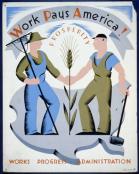 American society today suffers from two fundamental anxieties. One is economic and has many sources, including the accelerating pace of technological change, the impact of our economy and ways of life on the environment, the globalization of both labor and capital, and worrisome demographic trends.
American society today suffers from two fundamental anxieties. One is economic and has many sources, including the accelerating pace of technological change, the impact of our economy and ways of life on the environment, the globalization of both labor and capital, and worrisome demographic trends.
Our other anxiety is moral. Its causes are varied as well, but chief among them is increasing social fragmentation resulting in a loss of trust in one another and the lack of any sense of a common good. Economic considerations tend to push aside all others in our political system, but in the long run, barring an ecological catastrophe, the lack of agreement about what ultimately matters is a far more serious threat to the vitality of our democracy.
The roots of our anxieties are not unrelated. They feed off and exacerbate each other. Because we lack a vision of a common good above and beyond the sum total of our individual interests, we accept the idea that the best society is the one that satisfies the economic interests or desires of the greatest number of citizens. Thus, the defining characteristics of a healthy nation become an ever-expanding economy and rising standards of living. We come to expect, individually and collectively, continuous economic progress as a birthright.
When these expectations are not met, when people begin to feel economically insecure, they look for someone to blame and this blaming sets us against each other, worsening the social fragmentation that already obstructs our vision of a common good.
The search for a common good is the domain of the humanities. History, literature, philosophy and cultural studies provide us with the ideas and insights, analytical and interpretive tools, and language we need to understand each other and, just as importantly, to understand ourselves. Without such understanding, there is little hope that we will discover the shared aspirations and ideals out of which a durable sense of the common good can emerge.
Our lack of a sense of the common good affects virtually all aspects of public life. Two of the most prevalent manifestations are rampant cynicism and disdain for virtually all things “public” and the much-bemoaned decline of civility and decorum in public discourse in general, and in politics in particular.
Here, too, the humanities — and particularly public issue-oriented humanities programs like The Public Humanist blog — can provide some remedy.
When the perspectives of history, literature, philosophy and the other humanities disciplines are brought to bear on a controversial social issue, a broader context is created within which a dispassionate and reasoned exchange of views can occur. Unrecognized connections between the issue at hand and other important issues are revealed; ways the controversy has been resolved (or not) in other times or in other places are presented for comparison; the underlying values at stake in the controversy are exposed, and alternative means for preserving those values can be imagined.
None of this leads automatically to agreement, of course, but agreement, or at least a modicum of mutual understanding, is far more likely to occur in this context than in a partisan debate between opposing interests.
Clearly at this time in the life of our nation we need more humanities, more attempts to understand each other, and ourselves, and to try to reach some agreement about what ultimately matters.


